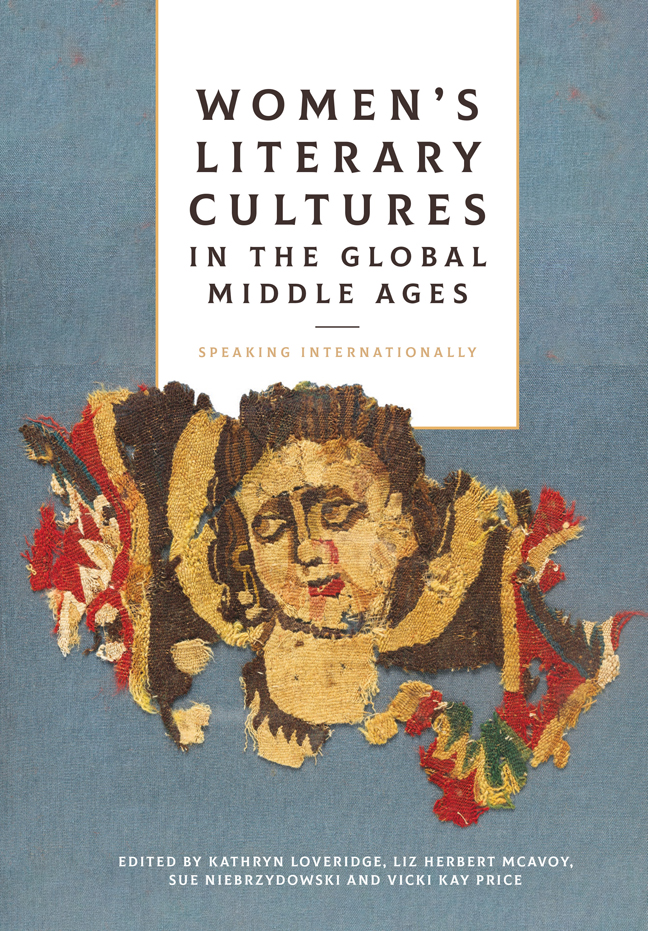Book contents
- Frontmatter
- Contents
- Foreword
- Acknowledgements
- List of Abbreviations
- Book part
- 1 Comparison and Dialogue
- 2 Constructing Gender and Genre
- 3 Saintly Performance and Marian Piety
- 4 Evidence and the Archives: Revisiting and Reconsidering
- Afterword: Intersectionality and Coalitions
- List of Contributors
- Bibliography
- Index
- Gender in the Middle Ages
Foreword
Published online by Cambridge University Press: 09 January 2024
- Frontmatter
- Contents
- Foreword
- Acknowledgements
- List of Abbreviations
- Book part
- 1 Comparison and Dialogue
- 2 Constructing Gender and Genre
- 3 Saintly Performance and Marian Piety
- 4 Evidence and the Archives: Revisiting and Reconsidering
- Afterword: Intersectionality and Coalitions
- List of Contributors
- Bibliography
- Index
- Gender in the Middle Ages
Summary
This volume had its origins in the conference ‘Speaking Internationally: Women's Literary Culture and the Canon in the Global Middle Ages’, hosted by Bangor University in June 2019. The conference itself followed on from the Women's Literary Culture and the Medieval English Canon international network, funded by the Leverhulme Trust from 2015 to 2017. Liz Herbert McAvoy, Sue Niebrzydowski and I were joined in the original network by five other project partners: Amy Appleford, Laura Saetveit Miles, Denis Renevey, Corinne Saunders and Nancy Bradley Warren. Together we set out to challenge both the exclusion of much medieval women's writing from the English literary canon and the idea that medieval women's literary history represents a tradition distinct from that of men. In this context, women's literary culture was defined broadly to include not only women's writing, but also women's roles as patrons, readers, and subjects of texts. The network sought to explore whether Chaucer, his contemporaries, predecessors, and successors had more in common with women's literary culture than had previously been assumed.
The network held two workshops during the first two years of its funded period: the first was hosted at Chawton House Library, Hampshire; the second at the Elie Wiesel Center for Jewish Studies, Boston University, USA. One issue that emerged from these initial meetings was that the focus on the English canon was too restrictive, and that medieval English literary culture could not be artificially separated from continental European traditions. To address this, the geographical scope of the literature under scrutiny was extended for the final network event: an international conference at the University of Bergen, Norway, which attracted over 60 delegates attending from around the world, including Canada, the USA, continental Europe, the Middle East and South-East Asia.
However, even with this wider geographical range, the network partners became increasingly aware of the limitations of our approach. We recognised the urgency of critiquing the very idea of a literary canon and of looking beyond the borders of our existing knowledge, our intellectual comfort zones. As Ankhi Mukherjee observes in her 2013 study, What Is a Classic? Postcolonial Rewriting and Invention of the Canon: ‘The canon has historically been a nexus of power and knowledge that reinforces hierarchies and the vested interests of select institutions, excluding the interests and accomplishments of minorities, popular and demotic culture, or non-European civilizations.’
- Type
- Chapter
- Information
- Women's Literary Cultures in the Global Middle AgesSpeaking Internationally, pp. vii - viiiPublisher: Boydell & BrewerPrint publication year: 2023



